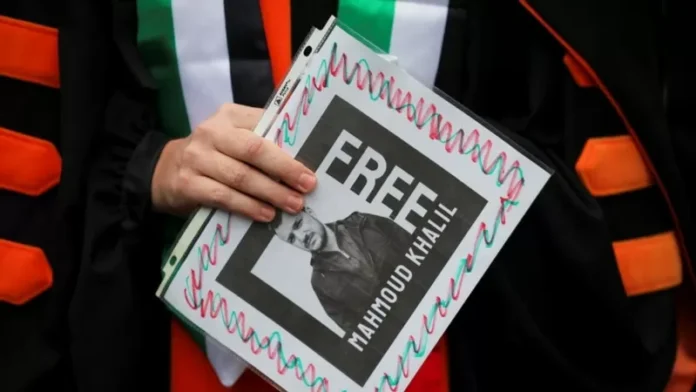Washington — The recent arrest of Palestinian activist and U.S. legal permanent resident Mahmoud Khalil has sparked concerns about the limits of a green card. Khalil, who has been a green card holder since 2024, was granted lawful permanent residency status in the United States. However, as with any privilege, this status can be revoked if the holder violates immigration laws.
Khalil, who played a prominent role in last year’s Columbia University protests over the war in Gaza, has not been charged with any crime but remains in detention in Louisiana. A federal judge has extended efforts to halt his deportation, raising questions about the process and what it means for green card holders.
It is important to note that it is not a criminal offense to openly disagree with the U.S. government’s policies or actions. The Bill of Rights protects free speech and the right to assemble. However, as New York-based immigration lawyer Linda Dakin-Grimm told VOA, a green card is not citizenship and can be revoked if the holder engages in conduct that goes against the conditions of their permanent residency.
According to Dakin-Grimm, the most common reason for revoking a green card is when a holder is convicted of a crime. These crimes can include aggravated felonies, drug offenses, fraud, or national security concerns such as ties to a terrorist group. Green card holders can also lose their status if they are deemed a threat to national security.
If a green card holder is accused of a crime, their case will go through the criminal justice system. However, the process to revoke their permanent status takes place in immigration court, where officials must present evidence to justify the revocation.
The process of revoking a green card starts when the U.S. government determines that an individual has violated immigration laws. This can happen through routine immigration checks, law enforcement investigations, or whistleblowers. The Department of Homeland Security usually initiates the process, and the green card holder will receive a Notice to Appear in immigration court or may be arrested and detained in serious cases.
White House officials have stated that Secretary of State Marco Rubio has the authority to revoke a green card or any visa if an individual’s activities in the United States “would have potentially serious adverse foreign policy consequences” for the country. However, Rubio has made it clear that Khalil’s case is not about free speech.
“No one has a right to a green card, by the way. If you told us that’s what you intended to do when you came to America, we would have never let you in,” Rubio said. “If you do it once you get in, we’re going to revoke it and kick you out.”
The authority for the secretary of state to intervene in a case like Khalil’s comes from the Immigration and Nationality Act of 1952. A provision in the law allows the secretary of state to deem a non-citizen deportable if their presence or activities are believed to significantly harm U.S. foreign policy interests. According to Khalil’s Notice to Appear, Rubio has made that determination.
Khalil has been ordered to appear in front of an immigration judge on March 27 at the Lasalle Detention Facility in Louisiana. In immigration court, the burden of proof is on the government to show that the individual violated immigration laws. In Khalil’s case, ICE attorneys will ask for deportation, but they must prove that he is a threat to national security. The green card holder also has the right to present a defense.
Unlike the criminal justice system, where the government must provide a public defender for those who cannot afford an attorney, in immigration court, the government is not obligated to provide legal representation. This means that if an immigrant cannot afford an attorney or find one to represent them pro bono, they will not have access to legal representation.
Dakin-Grimm explains that the process can move quickly, but it is also complex. In the immigration court system, the decision to revoke a green card is an administrative procedure conducted by the Department of Justice, under the Executive Office for Immigration Review.
“It’s kind of like the government is prosecuting a case, and the judge is also the government,” Dakin-Grimm said.
If the immigration judge rules against the green card holder, they can appeal to the Board of Immigration Appeals (BIA). If the BIA also rules against them, they can then appeal to a Federal Court of Appeals. While the case can ultimately end

